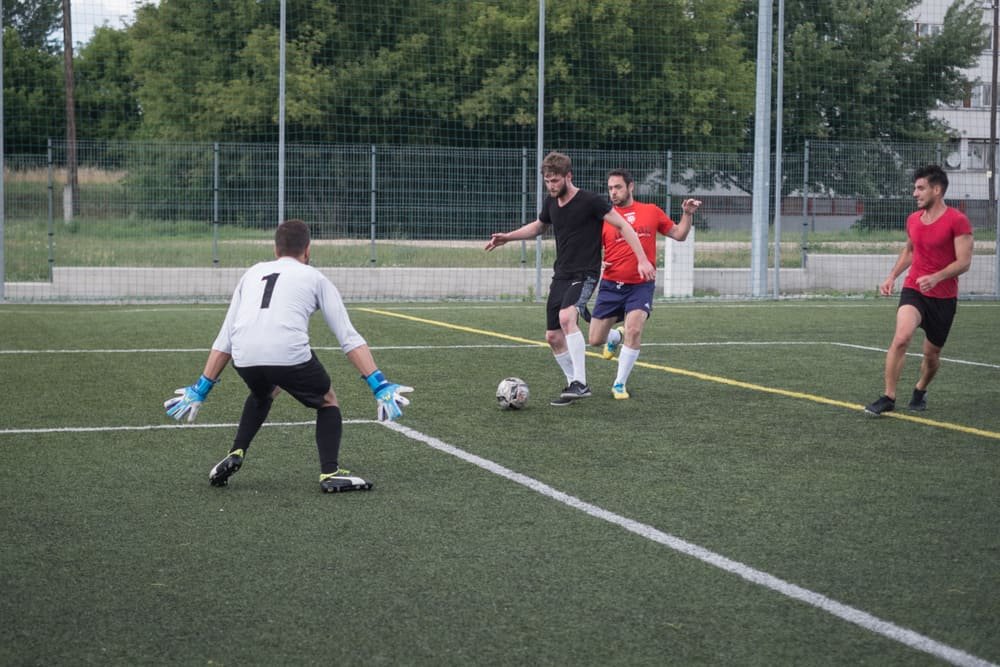
Many players who are attending their first soccer tryouts are understandably confused. Some aren’t sure how to properly prepare. Others need to know what they can do during the tryout to increase their chances of making the team.
If you’ve got a soccer tryout coming up, this article will tell you exactly how to prepare and what you should do during the tryout to give yourself the best shot at making the cut.
These are 15 must-know tips for your soccer tryout.
1. Arrive in shape.
Soccer is a sport that requires a high level of physical conditioning. Unlike most of the other tips on this list, getting in shape isn’t something you can do overnight. It takes months of consistent effort to get to the point that a few minutes on a soccer pitch won’t leave you winded and out of breath.
The best way to ensure you’re in shape for your tryout is to consistently work out in the months leading up to it. Alternate between long-distance runs and spring sessions, as both aerobic and anaerobic fitness are needed in an effective soccer player.

2. Get there early.
To maximize your chances of making the team, get to the tryout at least 15 minutes ahead of time. There are a good number of reasons you should do this:
- Arriving early will give you the opportunity to stretch and loosen up.
- Arriving early will also show the coaches that you’re trustworthy and reliable.
- Planning to arrive early will give you some leeway in case there’s traffic along your route that would otherwise make you late.
- Arriving early will let you talk to some of the other players and get to know them a bit better.
3. Eat properly beforehand.
If you want to put your best foot forward in this tryout, you’ll need to have a consistently high level of energy and a focused mind for the entirety of the session. The best way to ensure this is to eat foods that will supply you with that energy before the tryout begins. Don’t eat too soon before the tryout though ‒ your food might not have enough time to properly digest, and you could find yourself cramping up in the middle of the session.
4. Come prepared.
Make sure you bring everything you need to play. This includes cleats, shin guards, knee-high socks, comfortable shorts, a comfortable shirt, and a water bottle. If you’re trying out for the goalie position, make sure you also bring goalie gloves and a mouthguard.

Some tryouts also have uniform requirements. Before you gear up and leave the house, check the tryout web page or flier to see if the coach has stipulated any particular kind of shirt, shorts, or socks that you need to wear. If there’s a uniform requirement ‒ and you show up without it ‒ this will immediately give the coach a poor impression of you and affect your chances of making the team.
5. Stretch before you play.
Stretching before any kind of intense workout is essential. Not only will it make you perform better, but it will also decrease your risk of injury.
Any soccer tryout you attend will have a stretching session during the warmup process, but these are often quick and not thorough enough. If you get to the tryout early, you can use the extra time to do some additional stretching yourself.
6. Work hard every moment.
Coaches want to see a good work ethic more than anything else. A player who puts their “head down” and works hard can be taught to play better. If you consistently work hard and don’t complain, the coach will notice that, and it will definitely improve your chances of making the team.

7. Be friendly to your potential teammates.
Making friends with the other players at the tryout will not only make the session more enjoyable, but it will also show the coach that you can work well in a team environment.
Remember, soccer is a team-based sport. Even the most technically-skilled player will have a hard time succeeding if they hog the ball and aren’t willing to work with their teammates. Coaches know this, and they prioritize players who do work well on teams over those who don’t.
8. Do what you’re best at.
Everyone has their own particular skill set. Some players have flashy moves that can get around defenders. Others are like brick walls on defense that nobody can get past. And others still excel at waiting in the wings to score off the perfect pass.
Whatever your playstyle is, use it to your advantage. Now is not the time to try something new ‒ you can improve your skills all you want in a normal practice setting, but you should be focusing on making the team during a tryout.
9. Listen to the coach.

Coaches need players who listen to them. If a player isn’t willing to follow a coach’s game plan or take a coach’s criticism, the coach is going to have a hard time incorporating them into the team.
So whenever the coach speaks, listen closely to their every word. If they give you instructions, follow those instructions to the letter. This ability to listen will separate you from the other players, and therefore increase your chances of making the team.
10. Communicate well.
Listening to the coach is important, but communicating well with your fellow players is perhaps even more crucial. Without good communication on the pitch, your team isn’t going to perform well during games. Showing that you can both give instructions and listen to the other players on the field is something the coach will notice.
11. Take notes (if possible).
Most soccer tryouts are an entirely outdoor event, but coaches will occasionally take you into a classroom setting to talk about strategy and tactics. If this happens, bring a notebook with you and take notes at the meeting. This will make you look prepared and determined to succeed, which will make it more likely that you make the final cut.
12. Play with confidence.

Your coach will notice if you’re confident in your soccer abilities or not. Therefore, you need to play like you know exactly what you’re doing ‒ even if you’re not sure all of the time. Mistakes can be easily fixed, but a lack of self-confidence is usually a deep-seated problem that many coaches will be hesitant about working with.
13. Be a leader.
All teams need leaders. If you feel comfortable taking up the leadership mantle, your teammates will look up to you, and your coach will think more favorably of you. It can also increase your chances of becoming one of the team captains, which is an honor many players strive for.
14. Be respectful and professional.
Being respectful and professional is always important during soccer practice ‒ but it’s especially important at a soccer tryout. Normal soccer practices can have a more relaxed atmosphere when everybody knows each other, but nobody is all that familiar with each other at a soccer tryout.
So if you’re a jokester or have a sarcastic attitude about things, try to keep it in check during the tryout. You’re free to express yourself more fully once regular practices begin, but try to shelve that part of you until you actually make the team.
15. Know which position you’re trying out for.

This list item is an extension of number 8, which is “Do what you’re best at”. If you know you’re best as a forward or a defender, make that known to the coach and participate in drills that test your skills in that position. The coach can easily place you in another position if something else needs to be filled, but the probability of you making the team will be highest if you try for the position you’re best at.
